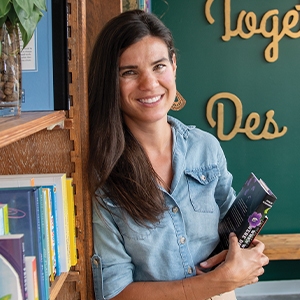Writer: Jennifer Wilson
We humans were never born to read. To do so, in fact, we rearranged the very organization of our brains thousands of years ago. And as we evolved, so did our technology, from stone tablets to parchment to typewritten pages to this very magazine you hold in your hands.
Physical reading has improved our health and expands how we think, make inferences and solve problems, said Maryanne Wolf, a UCLA literacy scholar who researches the effects of reading and has documented her discoveries in “Proust and the Squid” and “Reader, Come Home.” “In brain science, there’s a distinction between the different forms of empathy — one cognitive and one more emotional. Reading gives us both.”
But as we’ve moved our words to screens, the effects aren’t the same. All the word spotting and skimming and scanning drives us to distraction and inattention. On screen, we lose the benefits of empathy and critical analysis. It’s harder to focus. You may have received a notification or two even while reading these first three paragraphs.
“This is an essential moment in history where our technologies are encouraging bad habits of mind,” Wolf said.
Lucky for you, dear reader, our city offers all sorts of new ways to engage your reading brain. The Des Moines National Poetry Festival (renamed Poetry Palooza) returned last year. The Des Moines Public Library’s Iowa Author Awards, held in the fall, champion working writers who find this place fertile for more than corn and soybeans. The Des Moines Book Festival is opening a new chapter this year, under new leadership from Beaverdale Books.
If the measure of a city’s well-being is its bookstores, Des Moines is in growth mode. We’ve gained two new independent shops and celebrated the expansion of a third — each offering nooks for young and old to tuck into what Marcel Proust called the sanctuary of reading, where we gain entry to thousands of realities without even leaving the chair.
“Book lovers recognize other book lovers,” said Linzi Murray, owner of Reading in Public Bookstore + Cafe, which opened last year at 315 Fifth St. in Valley Junction. “We have our own vocabulary, appreciations and feelings when it comes to books and reading.”
So here are a few of our own people and places — all dedicated to the joy and mental health that can come from words on a page. Chances are, we’ll see each other around.

East Village: Ephemeral, Enduring
Abbey Paxton opened Storyhouse Bookpub in 2021 at 505 E. Grand Ave. in the East Village. It’s a sunny spot in the busy shopping district, often packed with parents reading to kids, and booklovers leaning against the stacks but absorbed in another world.
“My favorite thing about owning a bookstore is being able to create a physical space where we can truly gather around the art of reading and writing,” Paxton said.
Her shop regularly convenes booklovers with a strong lineup of readings and events. She invites writers connected to the Des Moines community or those who travel the literary superhighway between here and Iowa City, a UNESCO City of Literature and home to the University of Iowa Writers’ Workshop — writers “who reflect our values of pursuing joy and equity in our city,” she said. “There’s something there about sharing physical books, from writer to reader and reader to reader, that cannot quite be replicated digitally.”
For those readers who also love writing, just around the corner from Storyhouse is Ephemera, at 505 E. Locust St. The “community space for paper lovers” is the perfect place to pick up a thick, quality journal or some personalized stationery.
“For me, there are just some pieces of paper that feel like a treasure,” said Arin Hummel, who co-owns the store with Karen Brady. “I love the toothiness of a good piece of cotton paper, the little hints of gold in Italian Florentine papers, the delicate nature of forgotten papers — those little gems hidden in a box in attics or under beds that tell whole stories.”
Ephemera also sells writing tools, the booklover’s side hustle. Choose from fountain pens to rainbow-colored gels to pencils with sassy messages. Hummel prefers the Retro 1951 Rollerball for its “satisfying line width, perfect pen weight and the lacquer barrel that comes in such gorgeous, rich colors.”
Consider taking your literary haul up the hill to the State Law Library, one of the city’s most Instagrammable reading nooks. “It’s a temple,” said Rep. Jennifer Glover Konfrst, who likes to print out bills to physically read them among the spiral staircases.
“When I’m surrounded by decades of printed and bound Iowa Code books, it’s a good reminder of the gravity and longevity of this work, as well as the evolution of our state,” she said. “It serves as a reminder that this work is bigger than any one person.”
Valley Junction, via New York
Murray, from Reading in Public, has loved reading for as long as she can remember. “Not just the act of reading itself, but also cracking open a brand-new book, smelling the pages, running my hands across the paper,” she said. “Holding a physical book is a simple, yet grounding feeling.”
That attention to detail plays to a deeper aspect of book loving: The feel of it. Even the smell of it — which, by the way, is lignan, a compound found in paper that’s close olfactory kin to comforting vanilla and abundant anywhere books are gathered.
Murray graduated from Drake University and lived in Brooklyn for a few years, where she spent the pandemic browsing bookstores and building themed collections on her Bookstagram (@abookishendeavor on Bookshop.org). She took notes about the physical touches and less tangible details in her favorite New York book haunts. They “showed me the potential of what these spaces could be in a community: a solace to escape from the world for a while, a place to gather and a source of advocacy for social issues,” she said. “This is what I wanted to bring to Des Moines.”
A great bookstore can be read, in a way. It calls out its style, then structures itself accordingly, moving you through the aisles in a well considered way, elevating staff tastemakers so you might find alignment with your own.
Beaverdale, Bursting at the Seams
“I was fortunate enough to grow up in a house filled with books,” said Hunter Gillum, who co-owns Beaverdale Books with Alice Meyer. He loved his grandfather’s Modern Library Editions, for reading and simply admiring as objects. “I’ve always believed that buying books and reading books are two different hobbies.”
Beaverdale Books, at 2629 Beaver Ave., is a testament to Des Moines’ taste for both. The shop is expanding after nearly 18 years in business. It was bursting at the seams when the law office next door left last year, so Gillum and Meyer jumped on the opportunity. Their store is a popular spot for local authors as well as regional and national literary pacesetters like Carmen Maria Machado, who visited last fall. The expansion opens up more space for events and more room for the quiet pleasures of browsing.
It’s also a healthy indicator of the city’s book culture. “We are physical creatures,” said Paxton, from Storyhouse Bookpub. “As much as digital reading is convenient and often important in certain contexts, the book as art and artifact will continue to be important.”
Now You Know a Guy
If you’re wondering how to put the just-right spin on that box of thank-you notes from Ephemera, you should meet Garry Wilaby. He retools vintage typewriters at his workbench in Pleasant Hill, where you can buy, say, an Olivetti Studio 44 (the typewriter of choice of Raymond Chandler and Ralph Ellison) or the gold-standard Hermes 3000 (favored by Sylvia Plath, Elie Wiesel and Larry McMurtry). The boxy tools of trade from another time offer another way to connect with words on a page, with the snap of each key and the crisp poke of each letter.
“I’m always amazed at how much people are into these things,” Wilaby said while tinkering with a Royal Futura 800 (Dwight D. Eisenhower’s fave). “For me, it’s a job. And I just love doing it.”
Wilaby once sold Olivettis from a shop at 28th Street and Ingersoll Avenue. Now he restores all vintage models, most of which he can salvage because they’re built like Sherman tanks. His prices are reasonable on machines he finds himself. If you have one in the attic and want to revive it, he’ll quote you a price.
“Sometimes the typebars need soldering, or maybe the paper adjusters are messed up,” he said. “Other than that, it depends on how much you want to spend.”
For an appointment, call Garry Wilaby at 515-669-6517.
Jennifer Wilson is the author of two books, “Running Away to Home” (St. Martin’s Press) and “Water” (Raygun). She co-authors with Oma Blaise Ford the Substack “Analog Mix,” a weekly digital postcard about finding joy IRL for the generation that rode the tech divide but still likes to lose the password every once in a while.








